Progressive Men of Iowa
1899
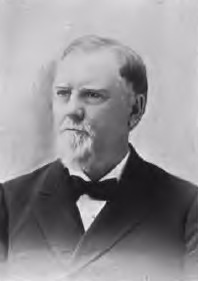 IVES,
Charles John, of Cedar Rapids, president of the
Burlington, Cedar Rapids & Northern
railroad, was born in Wallingford, Rutland
county, Vt., October 4, 1831, and is descended
from honored New England ancestry, connected
with the history of that section of the country
almost from the beginning. The founder
of the family in America sailed from England, on
the Truelove, and landed at Boston, Mass., on
the 19th of September, 1635. Our subject is
numbered among his direct lineal descendants.
His son, Joseph Ives, married Esther Benedict,
and became the father of Nathaniel Ives, whose
wife bore the maiden name of Mehitable Andrews.
Their son, Lent Ives, was the grandfather of our
subject, and married Mary Mighell. The father of
our subject, John Ives, was born in Wallingford,
Vt., and by occupation was a farmer and
merchant. In 1847 he came to the west, locating
in Lee county, Iowa; he died at the age of 63
years. His wife, who descended from New England
ancestors, bore the maiden name of Lucretia
Johnson. IVES,
Charles John, of Cedar Rapids, president of the
Burlington, Cedar Rapids & Northern
railroad, was born in Wallingford, Rutland
county, Vt., October 4, 1831, and is descended
from honored New England ancestry, connected
with the history of that section of the country
almost from the beginning. The founder
of the family in America sailed from England, on
the Truelove, and landed at Boston, Mass., on
the 19th of September, 1635. Our subject is
numbered among his direct lineal descendants.
His son, Joseph Ives, married Esther Benedict,
and became the father of Nathaniel Ives, whose
wife bore the maiden name of Mehitable Andrews.
Their son, Lent Ives, was the grandfather of our
subject, and married Mary Mighell. The father of
our subject, John Ives, was born in Wallingford,
Vt., and by occupation was a farmer and
merchant. In 1847 he came to the west, locating
in Lee county, Iowa; he died at the age of 63
years. His wife, who descended from New England
ancestors, bore the maiden name of Lucretia
Johnson.
Mr. Ives, whose name
introduces this sketch, may well be called a
self-educated man, for his school privileges
were somewhat limited, and in the school of
experience he has learned more valuable les-sons
than the common institutions of learning ever
afforded him. He attended the public schools of
his native county, and for a short time was a
student in the academy at Poultney, Vt. This
ended his school life, but an observing eye and
retentive memory and sound judgment have made
him a well-informed man.
Till 1847 he worked on his
father's farm, in Vermont. Then in Lee county,
Iowa, for several years, on a farm which his
father had purchased and upon which the family
had settled. He then delved in the mining
regions for several years, near Pike's Peak,
Colo. He does not seem to have gathered much
wealth, however, and on the 1st of October,
1862, he became connected with railroading as a
clerk of the Burlington & Missouri River
railroad, at Mount Pleasant, Iowa. On the 15th
of January, 1864, he was appointed clerk in the
local office in Burlington, Iowa, and from
January, 1867, until July, 1870, was clerk in
the general freight office in that city.
Since the latter date he
has been continuously connected with what is now
the Burlington, Cedar Rapids & Northern
railroad, but at the time when he allied his
interest with it, it was called the Burlington,
Cedar Rapids & Minnesota road. During the
first year he was general freight agent of the
first division, and from 1871 until October 15,
1874, served as general passenger and ticket
agent. On the 15th of October his duties were
further increased by an appointment as general
freight agent, and he served in that capacity,
as well as others, until October 28, 1875, when
he was made acting superintendent and general
freight, passenger and ticket agent. From
November 26, 1875, until November 28, 1879, he
was superintendent and general freight,
passenger and ticket agent; and from the latter
date until June 14, 1884, he was general
superintendent. He was then president and
general superintendent until June, 1893, and
since that time he has been president of the
road. His advancement has been steady and
continuous. The growth of
the road with which he has been connected so
long, has been largely accomplished through his
progressive efforts. When he became connected
with the Burlington & Missouri River
railroad, its western terminus was at Ottumwa,
Iowa; now the state is crossed and re-crossed by
a perfect network of railroads, facilitating
commerce, introducing all the improvements known
to the east, and advancing the state with a
rapidity that is known only to western
districts. The road of
which Mr. Ives is now president was only forty
miles in length when he first became identified
with it Now its aggregate length is 1,150 miles,
and it justly ranks among the most important
business institutions of Iowa. He rode upon the
first train of steam cars that made a trip in
this state. His own progress has been
proportionate to that of the road, and the farm
boy of forty years ago is today at the head of a
concern whose importance in the world of
commerce cannot be estimated. While
promoting in all possible ways the interests of
the railroad company, Mr. Ives has also
aided materially in the prosperity of Cedar
Rapids, by his connection with various
enterprises there. He was for some time
president of the Cedar Rapids Electric Light
company, but resigned that position in January,
1893, owing to the press of other duties. His
capital has been judiciously invested and he has
become the possessor of a handsome property. He
is purely a business man, practical, energetic
and capable, with a mind to plan and a will to
execute.
In 1854 Mr. Ives was united
in marriage with Miss Ellen M. Dale, of
Wallingford, Vt., and six children were born to
them. A son and
daughter are living with and near him. The
mother died April 16, 1895. Personally
Mr. Ives is courteous and affable, a gentleman
in the truest and best sense of that term; and
while his career excites the admiration, it also
commands the respect of
all.
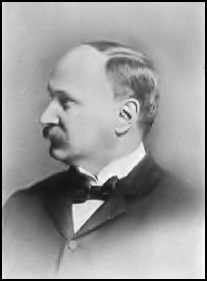 KILBORN,
William Franklin. The history of the Kilborn
family gives abundant proof that their name, in
its varied orthography, is prominent among those
whose ancestry can be traced hundreds of years.
This name has long been associated with the
history of England. It is mentioned in the rolls
of Scotland, preserved in the Tower of London
and Westminster Abbey, as early as 1336, and is
also mentioned by such noted English writers as
Halsted and Brayley, who speak of the Kilborns
being "seated" at Kilborn, in Yorkshire,
afterwards settling in Cambridgeshire and Essex.
"Seated," as used by English historians,
signifies that the family heritage was located
at the place mentioned. The occasion of the
grant of arms to the Kilborn family is unknown,
but history states: " This pedigree being
authentically proved, is entered in the
visitation of London, A. D. 1634.-Hon. St George
Richmond." KILBORN,
William Franklin. The history of the Kilborn
family gives abundant proof that their name, in
its varied orthography, is prominent among those
whose ancestry can be traced hundreds of years.
This name has long been associated with the
history of England. It is mentioned in the rolls
of Scotland, preserved in the Tower of London
and Westminster Abbey, as early as 1336, and is
also mentioned by such noted English writers as
Halsted and Brayley, who speak of the Kilborns
being "seated" at Kilborn, in Yorkshire,
afterwards settling in Cambridgeshire and Essex.
"Seated," as used by English historians,
signifies that the family heritage was located
at the place mentioned. The occasion of the
grant of arms to the Kilborn family is unknown,
but history states: " This pedigree being
authentically proved, is entered in the
visitation of London, A. D. 1634.-Hon. St George
Richmond."
The family motto is, "
Vincit Veritas. " From Thomas Kilbourn, who left
Cambridgeshire, England, in 1636 to locate with
his family at Wethersfield, Conn., have
Descended all Americans bearing this name. The
Kilbourns are well represented in Canada, Iowa,
Wisconsin and Ohio. Payne Kenyon
Kilbourn, of Litchfield, Conn., is among the
prominent members of the family. He is author of
the "History of the Kilbourn Family," a work
dedicated to Hon. Byron Kilbourn, president of
the Kilbourn Historical and Genealogical
society, of Milwaukee, Wis., and for whom
Kilbourn City, Wis., is named. Captain
Whiting Kilborn, a Canadian settler, had a large
family of sons and daughters, of whom Jared and
David were noted pioneer preachers of the
Methodist church. David Kilborn
married Lavina Bowers, daughter of Samuel
Bowers, a land owner and manufacturer of Berlin,
Ontario. Their second son, William Franklin, was
born July 19, 1854, at Washington, Ontario,
where his parents lived until he was two years
old, when they moved to Plattsville, Ontario,
where his father engaged in a successful
mercantile and manufacturing business. David
Kilborn moved with his family in 1864 upon a
farm near Grand Rapids, Mich., where Frank's
time was divided between school and farm work.
In 1873, at the age of 19,
Frank Kilborn came to Cedar Rapids to continue
his education. He secured a
position in the photograph gallery of his uncle,
Wilber F. Kilborn, where his artistic ability,
industry and perseverance, with constant study,
enabled him to become most proficient. In 1878
he purchased a half interest in the firm of
W. F. Kilborn
& Co., and became sole owner in 1886.
Kilborn's gallery, the oldest in Iowa, has been
constantly improved and enlarged until now it is
one of the art Centers of the west. Through
constant application and study under competent
instructors, Mr. Kilborn has been eminently
successful in his work. His practical turn of
mind led him to study chemistry, and his
experiments resulted in the manufacture of a
paper for photographers' use which was put upon
the market in 1891 by the Western Collodion
Paper company. This K. K. paper proved very
satisfactory, and in 1894 the Eastman Kodak
company, of Rochester, N. Y., negotiated for the
plant. Messrs.
Kilborn & Co. went to New York to establish
the plant at Rochester, where Mr. Kilborn had
charge of the business for one year, when he
returned to Cedar Rapids. He then added a
photographic supply department to his business.
His chemical experiments during the last two
years have resulted in the manufacture of other
satisfactory papers. The products of the Kilborn
company are fast becoming leading brands. Mr.
Kilborn's great success lies in his continual
personal supervision of every branch of his
work. He is not only one of the leading men in
his chosen profession but is also a man of
influence in constantly widening circles.
Mr. Kilborn was
married at Lancaster,
Ohio, September 4, 1884, to Miss Mary Carty,
daughter of William J. and Ellen Carpenter
Carty. Mrs. Kilborn is a lady of culture and
refinement and an active worker in the church,
social and literary life of Cedar Rapids. Mr.
and Mrs Kilborn have two children: Mary Ellen,
born July 28, 1885, and Paul Franklin, born June
17, 1897. Kilborn
Place, with its spacious lawn, winding walks and
drive among forest trees, is one of the most
beautiful homes in Cedar Rapids.
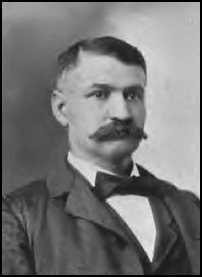 LEONARD,
John Calvin, attorney of Cedar Rapids, was born
in that city, October 18, 1855. He is the son of
Rev. George E. W. Leonard, the pioneer
Presbyterian minister of that city, who was
known and highly esteemed by all the old
settlers. Rev. Mr.
Leonard was married March 20, 1854, to Miss
Rezilda Crowe, of Columbia county, N. Y., and
soon after came west and bought a tract of 120
acres of land which now lies within the city
limits of Cedar Rapids and is very valuable. His
father was Charles Leonard, a New England farmer
of German descent, who located in New Jersey.
John C. Leonard is the oldest of seven children;
Emma, is the wife of John Stuckslager, a farmer
in Sioux county, Iowa; William C., is living in
Rock Valley, Sioux county, and is practicing the
profession of law; Mary R., a girl of rare
intellectual ability, and before whom lay the
brightest prospects of a happy future, died in
her 22d year, laying down her life with a
cheerful resignation to the Divine will; Dora
B., now Mrs. A. W. Bowman,
residing at Omaha, was a graduate of the high
school of Marion; Martha A., now Mrs. Dr. J. M.
Aiken, of Omaha, was educated at Coe college;
George E. graduated at Ann Arbor Law school and
is now practicing in Chicago. LEONARD,
John Calvin, attorney of Cedar Rapids, was born
in that city, October 18, 1855. He is the son of
Rev. George E. W. Leonard, the pioneer
Presbyterian minister of that city, who was
known and highly esteemed by all the old
settlers. Rev. Mr.
Leonard was married March 20, 1854, to Miss
Rezilda Crowe, of Columbia county, N. Y., and
soon after came west and bought a tract of 120
acres of land which now lies within the city
limits of Cedar Rapids and is very valuable. His
father was Charles Leonard, a New England farmer
of German descent, who located in New Jersey.
John C. Leonard is the oldest of seven children;
Emma, is the wife of John Stuckslager, a farmer
in Sioux county, Iowa; William C., is living in
Rock Valley, Sioux county, and is practicing the
profession of law; Mary R., a girl of rare
intellectual ability, and before whom lay the
brightest prospects of a happy future, died in
her 22d year, laying down her life with a
cheerful resignation to the Divine will; Dora
B., now Mrs. A. W. Bowman,
residing at Omaha, was a graduate of the high
school of Marion; Martha A., now Mrs. Dr. J. M.
Aiken, of Omaha, was educated at Coe college;
George E. graduated at Ann Arbor Law school and
is now practicing in Chicago.
When John C. Leonard was a
boy Cedar Rapids was but a country village. His
father's farm, now covered by a portion of the
city, was one of the most fertile and productive
in the township. Upon this farm John worked
during the summer, and during the winter months
attended school. June 13,
1873, he graduated at the city high school, and
during the next two years attended Cornell
college at Mt. Vernon. After leaving
college he read law for two years with Messrs.
Hubbard & Clark, then the attorneys of the
Northwestern Railway company, and in 1877 was
admitted to the bar and commenced the practice
of law at Cedar Rapids. In June, 1879, he was
admitted to practice before the supreme court.
Mr. Leonard's practice has been mostly railroad
litigation, either for or against the various
railway corporations operating in this state.
For the last fifteen years he has been attorney
for the Burlington, Cedar Rapids & Northern
Railway company. He was born and brought up a
republican, but takes no part in politics. He is
not a member of any society, club or church, but
is a man of decidedly independent turn of mind;
does not consider himself any better than the
average man and not as good as many, but has
never drank a glass of intoxicating liquor or
used tobacco in any form. He has four children:
Mary B., born October 10, 1881; Nathan B., born
November 29, 1883; John C., born May 8, 1891,
and Thecla C., born August 23, 1892.
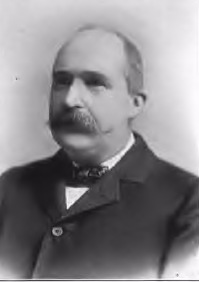 LINCOLN,
George Allen, for three terms mayor of Cedar
Rapids, is a familiar figure in republican state
conventions and has occupied a prominent
position in the councils of the republican party
in Iowa for many years He was born in Chicopee,
Mass., January 31, 1848, and was the son of
George D. and Mary E. Lincoln. With his parents
he went to Madison, Wis., in 1858, and when the
war broke out he enlisted in the Third Wisconsin
light artillery, December 22, 1863, and served
as a private in the army of the Tennessee until
discharged July 3, 1865. LINCOLN,
George Allen, for three terms mayor of Cedar
Rapids, is a familiar figure in republican state
conventions and has occupied a prominent
position in the councils of the republican party
in Iowa for many years He was born in Chicopee,
Mass., January 31, 1848, and was the son of
George D. and Mary E. Lincoln. With his parents
he went to Madison, Wis., in 1858, and when the
war broke out he enlisted in the Third Wisconsin
light artillery, December 22, 1863, and served
as a private in the army of the Tennessee until
discharged July 3, 1865.
Soon after the close of the
war he came to Cedar Rapids, March 25, 1867, and
engaged in the clothing business which he
followed until 1878, and retired with a
competency to go into the real estate business.
He organized the first volunteer fire department
in 1869 and was chief engineer from 1870 to
1876. He has always been identified with the
State Firemen 's association and was president
in 1892 and 1893. His connection with the city
government of Cedar Rapids began in 1874, when
he was elected alderman of the Third ward. In
1878 he was recorder and assessor of the city.
He was elected mayor in March, 1895, and was
twice re-elected, serving until March, 1898. Mr.
Lincoln was always elected as a republican and
has been actively identified with all the
movements of the party in Iowa since 1867. During all
that time he has hardly ever missed being a
delegate to the county and state conventions
every year. He served as a member of the
republican state central committee from the
Fifth district during the years 1890 and 1891.
In 1891 he was appointed postmaster of Cedar
Rapids, and served four years, and at the
present time he is chairman of the republican
county central committee of Linn county.
Although a strong anti-prohibitionist, he did
not leave the party during the prohibitionist
fight, believing that the time would come when
the party would not make that a test of party
fealty and would remove the issue from politics.
Mr. Lincoln has had a great part in the
development of the enterprising and rapidly
growing city of Cedar Rapids. He has been
identified with all its improvements and has
contributed liberally to promote public
enterprises. During his
administration as mayor, large public
improvements were made, including paving,
sewering, the new union passenger station, and
the Chicago, Milwaukee & St. Paul station.
It is largely on account of his influence and
activity that the republican state convention
was twice located in Cedar Rapids.
Mr. Lincoln was married in
Cedar Rapids, February 17, 1869, to Fannie
Atwell, and they have one daughter, Bertha, born
February 10, 1875. Of Mr.
Lincoln it can be said without the least
exaggeration that he is one of the most popular
men in the state. He has friends and intimate
acquaintances in every county, so that when he
goes to a state convention he can always find
friends and acquaintances glad to oblige him,
and he is in his turn very eager to serve a
friend.
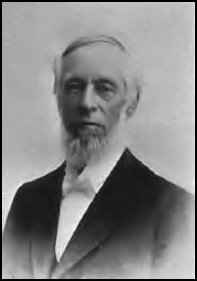 MARSHALL,
Rev. Alexander Stewart, D. D., late pastor of
the Presbyterian church at Marion, had at the
time of his death, February 3, 1896, almost
completed a pastorate of forty years. He was the
son of John and Elizabeth Stewart Marshall, and
was next to the youngest in the family of five
sons and three daughters. He was born April 29,
1829, on a farm near Dayton, Armstrong county,
Pa., and he received his education, after the
common school period, in Elder's Ridge academy
and Washington college, graduating from the
latter in 1853. He studied theology at Western
Theological seminary and Princeton Theological
seminary, and was licensed by the Blairsville
Presbytery in June, 1855. In December,
1855, he was united in marriage to Mary Rob
Christy, and removed to Marion the following
spring, preaching his first sermon April 20,
1856, in the old brick school building torn down
four years ago to make room for the new Prescott
building. The congregation April 20, 1856,
numbered thirty-five. MARSHALL,
Rev. Alexander Stewart, D. D., late pastor of
the Presbyterian church at Marion, had at the
time of his death, February 3, 1896, almost
completed a pastorate of forty years. He was the
son of John and Elizabeth Stewart Marshall, and
was next to the youngest in the family of five
sons and three daughters. He was born April 29,
1829, on a farm near Dayton, Armstrong county,
Pa., and he received his education, after the
common school period, in Elder's Ridge academy
and Washington college, graduating from the
latter in 1853. He studied theology at Western
Theological seminary and Princeton Theological
seminary, and was licensed by the Blairsville
Presbytery in June, 1855. In December,
1855, he was united in marriage to Mary Rob
Christy, and removed to Marion the following
spring, preaching his first sermon April 20,
1856, in the old brick school building torn down
four years ago to make room for the new Prescott
building. The congregation April 20, 1856,
numbered thirty-five.
In March, 1882, partly from
ill health and partly from a thought that
another might serve the church more efficiently,
he tendered his resignation, but the church
arose almost in a body to beg him to reconsider
it, and granted him a three months' vacation and
the means for himself and wife to spend it as
they chose. A man who can
live for forty years in one community, and have
no one speak slightingly of him when he is gone,
is more than an ordinary man. He was an
extraordinary man.
Among some of the things
that were said of him by L. P. Bardwell, editor
of the Marion Pilot, who bore no other relation
to him than that of a citizen, are these:
"His kindly greetings were
for everybody he met. Particularly was he a man
who had only good words for all. No unkindly
words were ever spoken in our presence. Never
intolerant in his views, he was nevertheless
decidedly firm in his convictions of what he
considered right. We believe his life was an
open book known and read by all men. His whole
soul was in his life work for the Master, and,
as we firmly believe, he fell bearing the cross.
In season and out of season, we have known him
to speak to the weak, discouraged, dejected, or
as some would put it-the fallen creatures of the
earth, always pointing them to the better way.
He was dearly beloved by the large membership of
his church, and by those called outsiders, who
were regular attendants-by the other
denominations with which he always maintained
the most cordial relations, and by the community
at large, who generously accorded him an honest
consistency in all his convictions " A writer
from Cedar Rapids, in the Mid-Continent, spoke
thus concerning him: " He stood for forty years
a witness for Christ in this community, till his
sound Presbyterianism, his Christian
benevolence, his pastoral influence, and his
loyal citizenship, have left their enduring
impress upon the church, the school, the town in
which he lived, and the whole surrounding
community. The people without regard to party or
creed, mourn his death. He was an earnest
expositor of God's word. He was most mindful of
the poor, the sick and the afflicted. He was the
friend of everyone in need, as well as everyone
who craved counsel and encouragement." Rev. Dr.
Marshall left four children: C. H. Marshall,
division chief clerk for the Chicago, Milwaukee
& St. Paul, at this point, and a member of
the city council; Miss Lizzie R., the present
efficient head of the Marion high school; Mrs.
Rosa Phelps, of Council Bluffs, and Miss Bertha,
a teacher in Brookline, Mass.
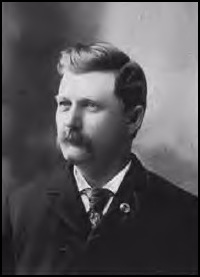 McMILLAN,
Horace G., United States district attorney for
the northern district of Iowa, and one of the
editors and owners of the Cedar Rapids
Republican, was born in Wayne county, Ohio, May
20, 1854. Three years
later his parents moved to Washington county,
Iowa, first living at Crawfordsville, and
afterwards on a farm four miles northeast of the
town of Washington. Mr. McMillan's father was a
man of sturdy character and of many attainments;
of Scotch blood; and his mother belonged to the
American pioneer women, who carried refinement
as well as industry into the new states of the
west and northwest. McMILLAN,
Horace G., United States district attorney for
the northern district of Iowa, and one of the
editors and owners of the Cedar Rapids
Republican, was born in Wayne county, Ohio, May
20, 1854. Three years
later his parents moved to Washington county,
Iowa, first living at Crawfordsville, and
afterwards on a farm four miles northeast of the
town of Washington. Mr. McMillan's father was a
man of sturdy character and of many attainments;
of Scotch blood; and his mother belonged to the
American pioneer women, who carried refinement
as well as industry into the new states of the
west and northwest.
As a boy, the subject of
this sketch spent more time on the farm than in
the schoolroom. He earned practically his own
way to a place, first at the bar, and afterwards
in the wider affairs of the state, in the
business and politics of which he has been
permitted to play a prominent part. His early
education was obtained in the country schools of
Washington county, and the academies of Grand
View and Washington. He studied law with
McJunkin & Henderson, of Washington, the
senior member of the firm being at that time
attorney-general of the state of Iowa. He was
admitted to the bar in 1880 by Circuit Judge L.
C. Blanchard, of Oskaloosa, and immediately
thereafter opened a law office in Washington. In
1882 he became interested in northwestern Iowa,
which was then in process of development, and
that same year he located in Rock Rapids, Lyon
county. A few days after he left his old home,
his father died, and, having endorsed for
friends and relatives, left an indebtedness of
about $4,000. Upon returning to Washington to
attend his father's funeral, young McMillan
called upon all the creditors and voluntarily
assumed this entire indebtedness. With this
burden on his shoulders, and with no money, the
young attorney invaded the open country of
northwestern Iowa, determined to succeed. Ten
years afterwards he returned to Washington for
the first time, having paid off every dollar of
the family indebtedness. In Rock Rapids be had
entered into a law partnership with A. Van
Wagenen. This partnership was dissolved in 1891.
In 1893 he formed another partnership, this time
with J. W. Dunlap, also of Washington county. As
a lawyer, Mr. McMillan has
been eminently successful. He has been
connected with much of the most important
litigation of northwestern Iowa, and has been
especially prominent in the bond litigation of
Lyon county. The county had been fraudulently
bonded for $170,000, and the various school
districts had been bonded for from $20,000 to
$250,000 each. Mr. McMillan has tried these
cases in both the state and United States
courts, the supreme court at Washington having
decided two of them favorably to him. These
services resulted in saving thousands of dollars
to the taxpayers of the new county. Mr. McMillan
has also been successful in the trial of
personal injury and damage cases, especially
those growing out of railway accidents. As a boy
of 19, he served one year as brakeman on the
Chicago, Milwaukee & St. Paul railway. His
practice has brought him a large income for many
years. Mr. McMillan
is also a businessman. He was one of
the first to grasp the possibilities of
northwestern Iowa, and on his faith in its
development made many investments in land, which
have turned out even better than he had
anticipated. He is today the owner of 1,000
acres of land in Iowa, and the adjacent counties
of Dakota, and manages the Lakewood stock farm,
near Rock Rapids, on which is maintained what is
conceded to be one of the finest, if not the
finest, herds of Jersey cattle in the state or
the west.
In 1898 the Cedar Rapids
Daily Republican was for sale, owing to the
death of its former chief owner, Mr. L. S.
Merchant. Seeing the excellent opportunity, it
offered for building up a strong newspaper and a
profitable business, Mr. McMillan and Cyrenus
Cole, for a number of years associate editor of
the Iowa State Register, bought the paper. It
immediately took rank with the leading dailies
of the state, grew in circulation and influence,
and is now enjoying a firmly-established
prosperity. The change occurred in May, 1898,
and Mr. McMillan removed with his family to
Cedar Rapids.
Mr. McMillan has, from his
boyhood up, taken an active part in politics,
being by birth and conviction an unswerving
republican. Before leaving Washington county, he
served as chairman of the county committee
there. In 1886 he was elected county attorney of
Lyon county, which office he filled for three
terms, although the county was democratic part
of the time. In 1892 he was elected a member of
the republican state central committee for the
Eleventh congressional district. He was
re-elected in 1894, and in 1895 was elected
chairman of the committee. He was in charge of
the campaign in which Gen. Francis M.
Drake was elected governor by an almost
unprecedented majority, and also had charge of
the Iowa campaign for William McKinley and
Garret A. Hobart, and his conduct of that
campaign won the praise of republicans and gold
democrats alike. In 1897 he desired to retire
from the state chairmanship, but was again
pressed into the service of his party as the
manager of the campaign for Leslie M. Shaw for
governor. As a campaign manager Mr. McMillan has
tenacity of purpose and persistence of effort
well combined with judgment and a wise spirit of
conciliation. Under him the party has developed
no factions, nor has it wavered. At the meeting
of the Iowa congressional delegation, in the
spring of 1897, Mr. McMillan was recommended to
the president for appointment as United States
attorney for the northern district of Iowa, an
appointment which was made by President
McKinley and confirmed by the senate in
February, 1898.
In his home life Mr.
McMillan has been happy and successful, as well
as in business, law and politics. In 1877,
before he began to study law, he was married to
Miss Alice Van Doren, of Washington county, who
has been a helpmeet to him, not only in his
home, but in his public life. Six children
were born to them, five of whom are living. They
are Glenn V., Viva Alice, Florence, James B.,
and Horace G., Jr. Mrs. McMillan has taken a
deep interest in the political affairs in which
her husband has been prominent She has taken,
especially, an interest in educational matters,
and was largely instrumental in the founding of
the free public library, of Rock Rapids, and
feels, with a woman's and a mother's pride, that
her best contribution to the world has been her
children.
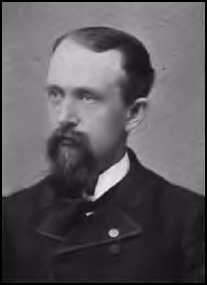 MILLS,
Mason P. (deceased), was born at East Windsor,
Conn., January 15, 1843; died at Cedar Rapids,
Iowa, July 31, 1896. The life of
this soldier, lawyer and citizen was a noble
example of the best there is in American
citizenship; his death a public calamity. As the
public is apt to place a correct estimate upon
the character of a man whose career has been a
highly prominent one the biographer can do no
better than to record in part an editorial which
appeared in the Cedar Rapids Republican at the
time of the death of Mr. Mills: MILLS,
Mason P. (deceased), was born at East Windsor,
Conn., January 15, 1843; died at Cedar Rapids,
Iowa, July 31, 1896. The life of
this soldier, lawyer and citizen was a noble
example of the best there is in American
citizenship; his death a public calamity. As the
public is apt to place a correct estimate upon
the character of a man whose career has been a
highly prominent one the biographer can do no
better than to record in part an editorial which
appeared in the Cedar Rapids Republican at the
time of the death of Mr. Mills:
"As a citizen he was, from
the first, active in all things that make for a
city. He was public
spirited and energetic to a degree attained by
few men. He was an alderman for many years, and
in this capacity did a great deal to shape
legislation. He was a born leader. If there was
an enterprise on foot, Mr. Mills was either for
or against it with all his might. He had the
courage, the strong intelligence, the rare and
subtle magnetism which, as public men are
analyzed, compose the requisites of the real
genius of leadership. As a lawyer
he attained a very high rank. He was a
worker, a master of the art of accumulation of
testimony-a tactician, skillful in
cross-examination, a perfect judge of men, and,
therefore, one who selected a jury with method
and keen analysis of those who presented
themselves for acceptance. Many of our foremost
businessmen relied upon him absolutely, and to
them the loss will be as a personal bereavement.
As a friend, perhaps the word loyal is the best
and most expressive adjective descriptive of
this phase of his character. It is the fortune
of strong characters like Mason P. Mills to be
strong in friendship and intense in resentment,
to have friends bound to them with hooks of
steel, and at the same time have those who
swear, familiar like, to love them not at all.
And now, what of him? It does not
seem possible that the soul of a man like Mason
P. Mills-the force that was in that brain-can
have gone out forever. Meeting by the side of
his grave this great question which is the dark
cloud on the horizon of all of us, we are glad
to know that he here found reason for hope."
The father of the deceased
died when he was a mere boy and the mother,
within a few years, married P. T. Crowell, of
Springfield, Mass., a trusted employee of the
United States armory at that city. The mother,
whose maiden name was Elizabeth Strong, was a
lineal descendant of the Grant family of East
Windsor. The early education of Mr. Mills was
acquired in the common schools. He was a student
in the Upper Iowa university at the breaking out
of the war, and at the first call for troops
went to Washington and enlisted in a squadron of
cavalry known as McClellan's Dragoons. This was
George B. McClellan's bodyguard. He served in
that capacity under the commanders of the army
of the Potomac until the winter of 1863-4, when
the squadron of cavalry was ordered to Chicago
and made part of the Twelfth Illinois cavalry.
There he was made sergeant of the regiment, and
afterward promoted to regimental quarter-master
and first lieutenant by Governor Yates. He
served gallantly at Yorktown, Antietam,
Fredericksburg, Chancellorsville, Gettysburg,
and in the seven days' fight before Richmond, as
well as in the smaller affairs in which the army
of the Potomac was engaged up to the year
1864. He was then
sent on the Red River expedition, under General
Banks.
He was mustered out of the
service February 17, 1865, but until July of
that year he was in the government employ,
having charge of Camp Fry, in Chicago. He was not
mustered out as an officer until 1887, when he
took advantage of the act of congress permitting
volunteer officers to be mustered according to
their rank, if they had failed to be so
mustered, owing to active operations in the
field. He did this in order to become eligible
to membership in the Loyal Legion, which he at
once joined.
When his country no longer
needed his services he commenced the study of
law in the office of Ira T. Buell, of Chicago,
and was admitted to the bar there in 1866. In 1867 he
located at Cedar Rapids and engaged in practice,
where he remained until his death. Although not
a college-bred man, he was recognized as a
thorough scholar. An omnivorous reader, his
whole life was a process of self education. He
was a republican in politics and was colonel on
the staff of Governor Gear during his last
administration. He was a prominent member of the
Loyal Legion and served as department commander
of the G. A. R. in 1890.
He was married October 14,
1869. to Miss Flora B. Coulter, daughter of
Dr. John Parshall
Coulter, lieutenant-colonel of the Twelfth Iowa
infantry. She is a lady of high attainments and
countless personal graces and domestic virtues,
so the beauty and happiness of their home life
may be imagined. To them were born three
children: John, born December 1, 1874; Flora,
born May 28, 1877, and Mary, born May 21,
1886.
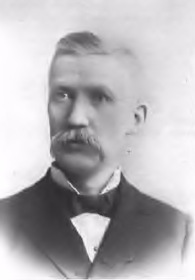 MOORHEAD,
Dr. James, is a native of the state of Ohio. He
is the son of Joseph Moorhead, who was born in
Holmes county, Ohio, January 15,1828, and was
married to Miss Clara A. Heller, of Chemung
county, N. Y., March 1,1849. She was the
daughter of Moses and Hannah Baker Heller. In
1855 Joseph Moorhead came with his family to
Linn county, where he purchased a farm and
settled on it, living a few years in a log
house. He worked on the farm in the summer and
taught public school in the winter for several
years. He was an influential citizen, serving in
various township and county offices. He served
six years as trustee of the state reform school
at Eldora. In 1881 he moved to Marion, having
been elected county auditor, serving in that
position six years. James was
born near Millersburg, Ohio, April 1, 1850. On
the paternal side his ancestors were from
Scotland, and from Germany on the maternal side.
His father and mother both having been school
teachers, his early instruction was carefully
directed. He first went to school to his father,
who taught in a rough, log schoolhouse two miles
from their home. MOORHEAD,
Dr. James, is a native of the state of Ohio. He
is the son of Joseph Moorhead, who was born in
Holmes county, Ohio, January 15,1828, and was
married to Miss Clara A. Heller, of Chemung
county, N. Y., March 1,1849. She was the
daughter of Moses and Hannah Baker Heller. In
1855 Joseph Moorhead came with his family to
Linn county, where he purchased a farm and
settled on it, living a few years in a log
house. He worked on the farm in the summer and
taught public school in the winter for several
years. He was an influential citizen, serving in
various township and county offices. He served
six years as trustee of the state reform school
at Eldora. In 1881 he moved to Marion, having
been elected county auditor, serving in that
position six years. James was
born near Millersburg, Ohio, April 1, 1850. On
the paternal side his ancestors were from
Scotland, and from Germany on the maternal side.
His father and mother both having been school
teachers, his early instruction was carefully
directed. He first went to school to his father,
who taught in a rough, log schoolhouse two miles
from their home.
His boyhood, when not in
school, was spent upon the farm, assisting his
father in the various kinds of labor required of
a farmer's son in those early days. When 18
years of age James taught school in the district
where he had obtained his education, and
continued teaching each winter for eight years.
He was a student at Cornell college for three
years. In 1876 he entered into partnership with
Dr. Terry, at Ely, in the drug business. He was
postmaster at Ely for ten years. He took a
two-years' course in pharmacy and graduated from
the National Institute of Pharmacy at Chicago in
1887. He moved to Cedar Rapids and opened a
first-class drug store, having a large
prescription business. During all
the years he was employed in the drug business,
Mr. Moorhead had been a studious reader of
medical books and publications, and finally
decided to take a medical course of instruction,
and entered the State university. There he
attended medical lectures, and graduated from
the homeopathic department in 1893, beginning
practice at Cedar Rapids, associated with Dr. W.
A. Hubbard. He afterwards took a post graduate
course in the Chicago Homeopathic college in
1895. In 1893 he bought the office and practice
of Dr. G. S. Muirhead, at Marion, and entered
upon the practice of medicine there. He has
established an extensive business, and, by his
skill and knowledge, won the confidence of the
community. He is local surgeon of the Chicago,
Milwaukee & St. Paul Railway company, and
also of the Bankers' Accident Insurance
company. In 1894 he
entered into partnership with Dr. Muirhead, who
had returned to Marion.
In politics Dr. Moorhead
has always been an active republican; has held
many township and school offices, and often
served as delegate to republican state
conventions. He is a member of the following
secret societies: Knights of Pythias, Royal Arch
Masons, Ancient Order of United Workmen,
Improved Red Men, and other lodges. He is
captain of Marion Company No. 23, U. R., K. of
P.; past chancellor of Mariola Lodge No. 8, K.
of P.; high priest of Marion Chapter No. 10, R.
A. M.; past
patron of Manon Chapter No. 188, O. E. S.; past
great sachem of Iowa, I. O. R. M. He is a member
of the Amer-ican Institute of Homeopathy, the
Hahnemann Medical Society of Iowa, and of the
Central Iowa Medical association. He is medical
examiner of the Knights of Honor, A. O. U. W.,
and Pacific Mutual Life Insurance company, and
others. He has always been an active worker and
member of the Methodist Episcopal church and its
auxiliaries
On December 24, 1871, he
was united in marriage with Miss Eliza J. Stream,
youngest daughter of Elias and Mary A. Waters
Stream, who were natives of Virginia Eliza was
born in Licking county, Ohio, October 14, 1851.
She came to Iowa with her parents, who settled
in Linn county, in 1855. Three children have
been born to them-two boys, who died in infancy,
and Clara A., born October 31, 1874. She
graduated from the Cedar Rapids high school in
1893 and from Cornell college in 1897, receiving
the degree of B. A.
The information
on Trails to the Past © Copyright
may be used in personal family history research,
with source citation. The pages in entirety may
not be duplicated for publication in any fashion
without the permission of the owner. Commercial
use of any material on this site is not
permitted. Please respect the wishes of
those who have contributed their time and
efforts to make this free site possible.~Thank
you! | |
|
|
| |
|